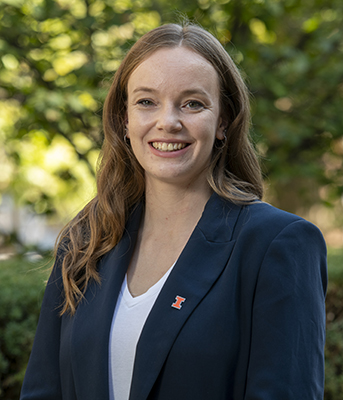Oct 31, 2023
How leader personality impacts audit team dynamics
Small auditing mistakes can have major consequences for a firm, from large regulatory fines to a loss of investor confidence that sends stock prices plummeting. Getting it right often takes a large team of individuals working together, which makes effective leadership essential. In her dissertation, Gies assistant professor Lena Pieper takes a closer look at this topic, providing new insights on audit teams and the people who lead them.
Team dynamics in auditing is a topic that’s often understudied, largely because data is so difficult to obtain. Most companies don’t like opening their internal processes to review, which makes it hard to observe team interactions in the wild. But thanks to a research grant from the Foundation for Auditing Research, Pieper was able to pierce that veil.

“I worked together with the biggest audit firms in the Netherlands and got data on their partners and their teams,” said Pieper, who recently completed a PhD in accounting at the Maastricht University School of Business and Economics. “Using theories from psychology and organizational behavior research, I studied how they work together and basically made the argument that, if we want to improve the auditing profession, we can’t just tighten regulation and focus solely on the audit process. We need to look at the human side and really understand what’s going on inside the teams to ultimately make audits better.”
To explore that human element, she created a series of surveys that focused on the personality and leadership styles of audit managers and partners, and their impact on team functionality. And in the process, she made several interesting discoveries.
For one, there were significant personality differences between the Big Four companies and smaller firms. Auditors in larger firms were, on average, more extroverted, conscientious, and open than their counterparts in small firms. However, the higher you go in both groups, the less variation there was in personality traits, meaning those at the top of their game are a fairly homogenous lot.
In another survey, she explored various aspects of leadership behaviors, focusing on auditing partners. Traditionally, audit partners are seen as “external” team leaders, dealing more with clients and deadlines than guiding the internal team. Through her research, however, Pieper found that teams ultimately perform better when partners do both, managing tasks and teams. This finding is in line with recent developments in auditing standards that call for more involvement of the lead engagement partner.
The biggest surprise, however, came when she explored how the audit partner and engagement manager partnership was formed and how that pairing impacts the engagement team. Using data from 227 audit-engagement teams, she found that 68% of the partners paired themselves rather than having the audit firm assign an engagement manager. This means most partners will choose to work with a manager who has a similar working style, which may or may not be in the best interest of the team.
What was even more surprising, however, was that partner-manager dyads in which both leaders had below-average skills on multiple dimensions were also working on high-risk clients. This means that companies are letting availability dictate project assignments, rather than making sure projects are matched with those with the best skills for the job, which could provide a set-up for disaster.
Pieper hopes that insights like these will lead to a broader conversation on audit quality. And she looks forward to having that conversation with students at Gies.
It was actually her passion for teaching that led her to pursue academia. “I love that moment when a student finally ‘gets it,’ and you see it in their eyes,” said Pieper, who could have taught anywhere, but chose to work at Gies because of its innovative spirit.
“They’re always striving to improve and be at the forefront,” said Pieper, citing the program’s courses around blockchain and cryptocurrency as one example. A lot of schools are slow to embrace change, she noted. But not Gies. “They’re always trying to adapt, and I like that.”
Pieper was introduced to Gies through Mark Peecher, Executive Associate Dean of Faculty and Research, whom she met while taking his course in Europe. She was so impressed by the things he had to say that she decided to check the school out for herself, becoming a visiting PhD at Gies last year.
For her, the experience was nothing less than inspiring.
“People are very passionate about their research at Gies, and they’re always looking to improve,” said Pieper. “I think that’s what I’m really looking forward to — being in an environment that pushes me and that I can grow in. That’s not the case everywhere. So, I’m really excited about that."


